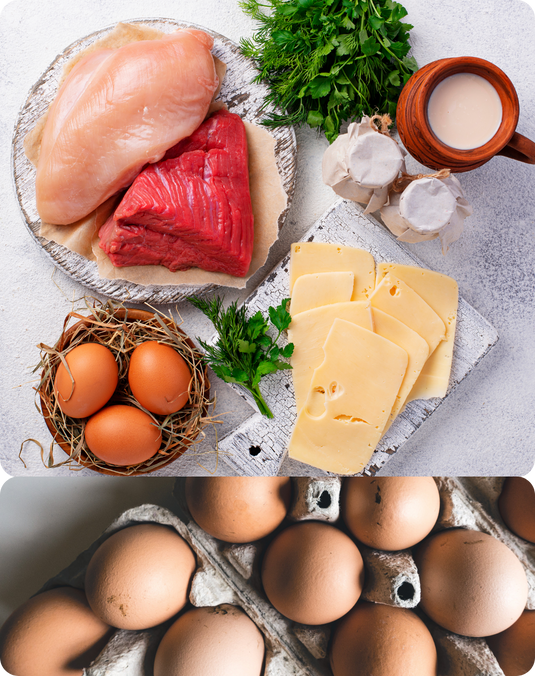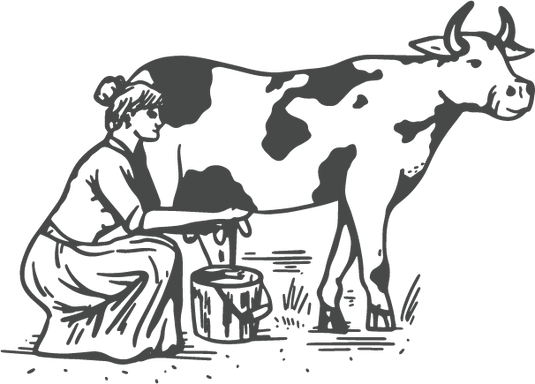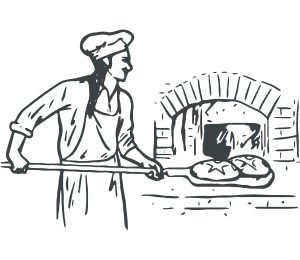

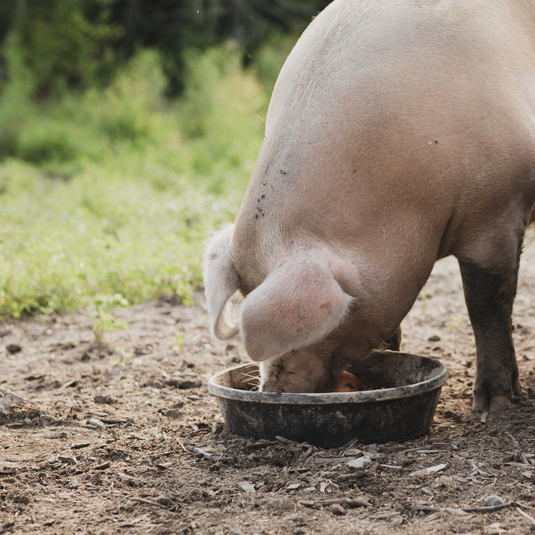
1. Custom-Made LowPs™ (Low PUFA) Feed
Pigs are monogastric animals and cannot thrive on pasture alone—they need supplemental feed to stay healthy. While pasture-raised pigs are often assumed to produce healthier meat, many still receive feed rich in polyunsaturated fats (PUFAs) from common ingredients like corn, soy, and distiller grains. Since a pig’s diet directly affects the fat composition of its meat, modern pork can have a fatty acid profile similar to canola oil—drastically different from what our ancestors consumed. This means that even pasture-raised pork can contain high levels of the unhealthy fats found in seed oils if fed conventional PUFA-heavy feed.
We take a different approach to produce chicken that is naturally lower in PUFAs. In 2021, Farmer Ash developed a custom hog feed free from corn, soy, and other high-PUFA ingredients. What began as a small-batch formulation in her garage is now produced by a local trusted feed mill partner, ensuring that every farm in our network raises hogs on a diet designed for a healthier fatty acid profile—low in PUFAs and rich in stable, nourishing saturated fats. This exclusive LowPs™ feed is uniquely formulated to be low in PUFAs, low in endocrine-disrupting Phytoestrogens, and low in Pesticides—something you won’t find anywhere else. Beyond crafting our own feed, we partner with regenerative row-crop farmers who grow our ingredients without synthetic pesticides. This gives us complete oversight of the process, ensuring our feed is as clean and wholesome as the meat it helps produce.
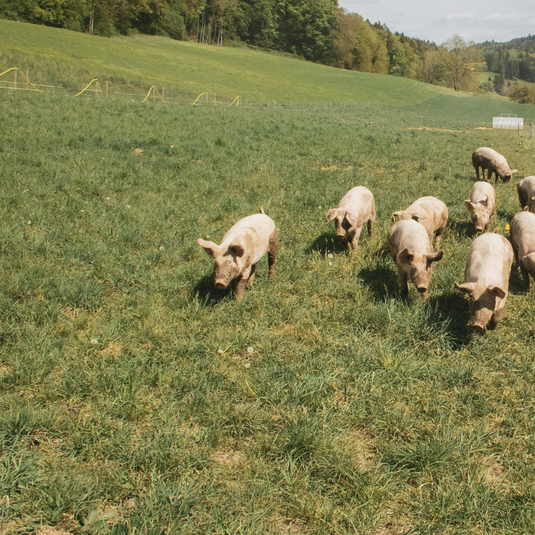
2. Mobile Pasture-Raised
We take pasture-raising to the next level with our mobile approach. All of our farm partners use mobile huts, moving them once a week to ensure the hogs always have access to fresh, nutrient-rich grass, with shaded areas provided by the huts to help them escape the heat. This system also requires mobile feeders and waterers to meet their needs on the go. While this method requires more time and attention than stationary barns, the benefits are undeniable—hogs naturally fertilize the land, their rooting and hooves provide beneficial animal impact, and the soil receives the rest it needs to regenerate. This fosters a thriving, chemical-free pasture ecosystem and results in meat that is not only healthier but also better for the environment.
With our mobile pasture-raised approach, the hogs experience true freedom—roaming, foraging, rooting, and enjoying mud baths. Regularly moved to fresh grass, they benefit from a diverse, forage-based diet rich in insects and natural nutrients, which enhances the quality of their meat. This system supports their natural instincts, promotes low-stress living, and offers a stark contrast to the confinement of barns and cages.
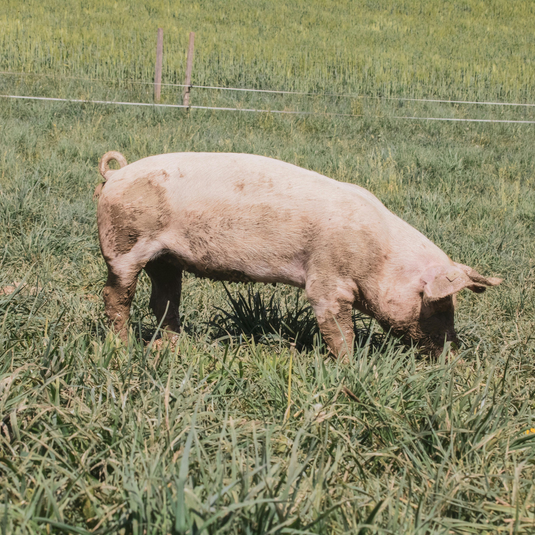
3. Free-Range on Pasture, Not Confined
All of our pigs are born and raised within our network of farm partners to ensure they are vaccine-free and non-medicated. We do not use artificial insemination (AI); instead, the male and female pigs are introduced strategically throughout the year during heat cycles. Piglets are born on pasture in farrowing huts and receive their mother’s milk directly from the teats. At six weeks, the piglets are weaned and rotated to fresh pasture until they are finished out.
During the winter months, when snow covers the ground and the mobile coops can no longer be moved, our farmers use the ‘deep litter’ method, popularized by Joel Salatin. The coop remains stationary, and bedding materials such as straw or wood chips are added throughout the season, creating a deep layer of organic matter. Microorganisms, worms, and insects break down the waste, turning it into rich, fertile compost, which is later spread on the pasture to improve soil health. While the hogs have access to shelter to stay warm and protected from extreme weather, they are still able to forage outdoors and are provided with hay for added nutrients like Vitamin K1, helping to keep them healthy and warm during winter.
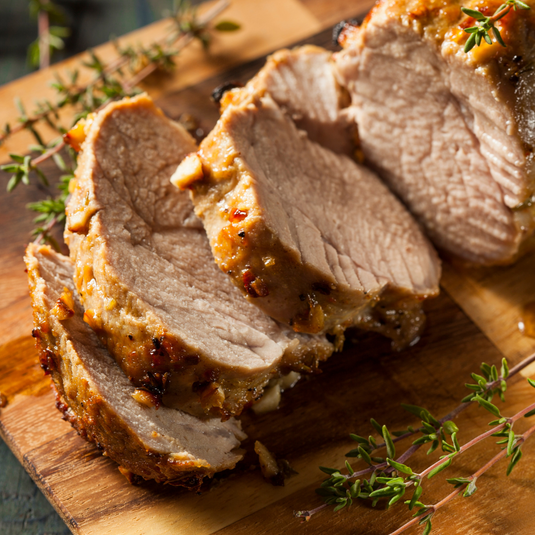
4. Superior Nutrient Profile
Pigs raised on pasture produce healthier, more nutrient-dense meat than those raised in confinement. Access to fresh grass and forage provides them with Vitamin K1, which they convert into Vitamin K2, enriching the meat with this essential nutrient. Sun exposure further enhances Vitamin D levels, increasing the fat-soluble vitamin content. A diverse, natural diet also leads to a superior nutrient profile, delivering more vitamins and minerals in every cut.
Pork isn’t just a great source of metabolism-supporting nutrients—it’s also an essential source of protein and healthy fats. Before industrial agriculture, pork meat was naturally low in polyunsaturated fats (PUFAs). Today, however, widespread corn- and soy-based feeds have dramatically increased PUFA levels in pork. By raising hogs on a more natural, diverse diet, we’re bringing back the pork meat of the past—lower in harmful PUFAs and richer in beneficial nutrients. Lab testing confirms that our pasture-raised pork contains significantly less Omega 6 PUFAs and significantly more of health promoting stearic acid.
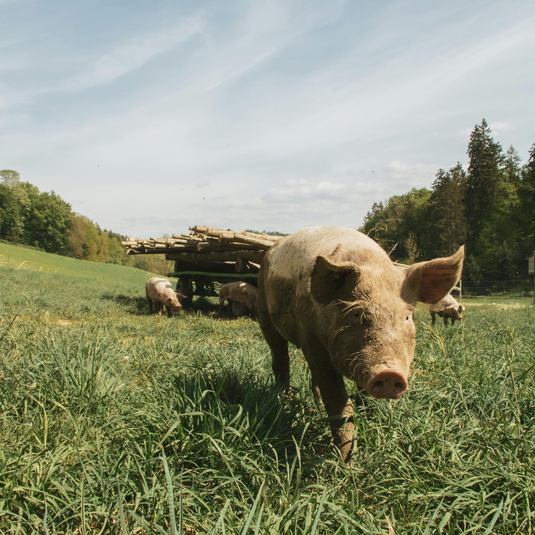
5. Needle-Free Production
The hogs at our partner farms thrive in a truly natural environment— so no vaccines, antibiotics, hormones, or dewormers are used or needed. Raised on fresh pasture, with clean air, regular rotation to new grass, and minimal waste exposure, they develop robust immune systems without the pharmaceutical crutches used in industrial agriculture.
By prioritizing regenerative practices, our farmers cultivate strong immune systems and natural resilience. A diverse diet from thriving pastures supports immune function, while constant movement reduces parasite and bacteria exposure. Freedom to roam and forage allows for adequate exercise, minimizing stress and ensuring optimal health. This holistic approach makes pharmaceutical interventions unnecessary—not just prohibited.
Our promise: Hogs raised in true health and harmony with nature, resulting in pure, wholesome meat—just as nature intended.
